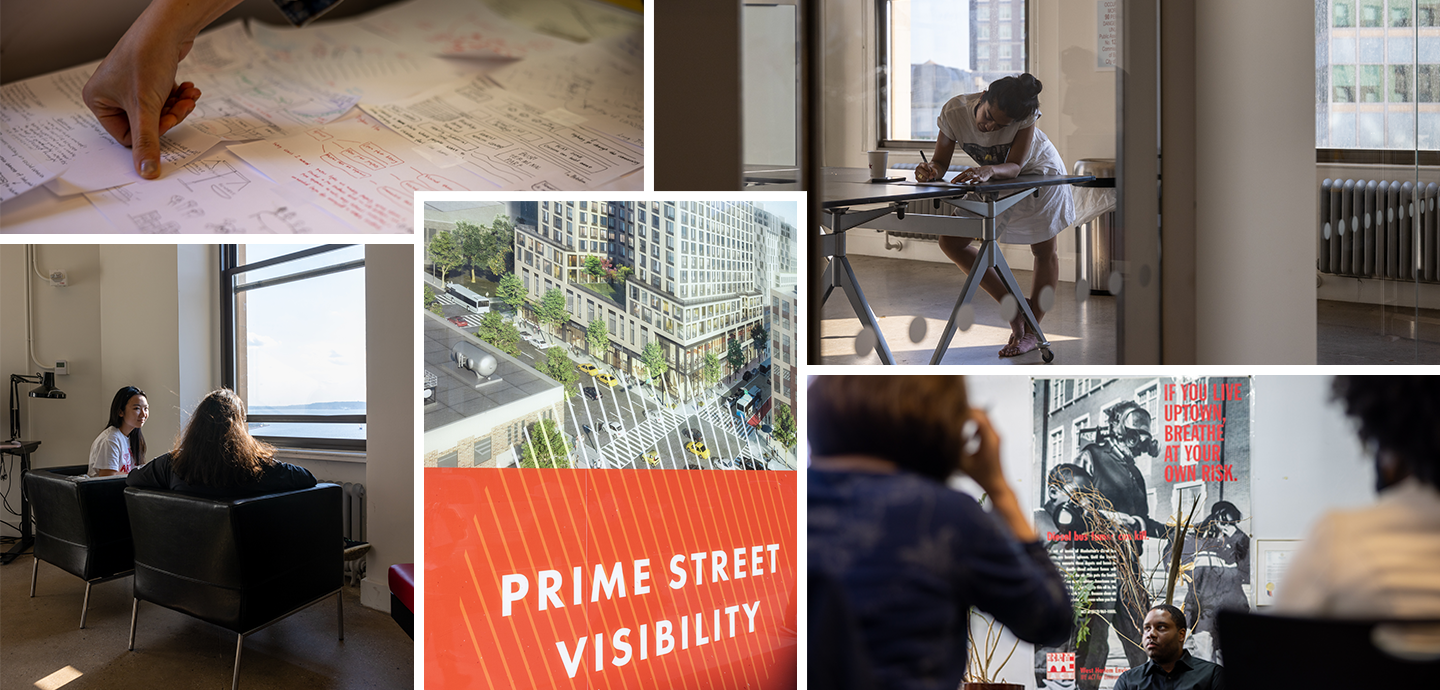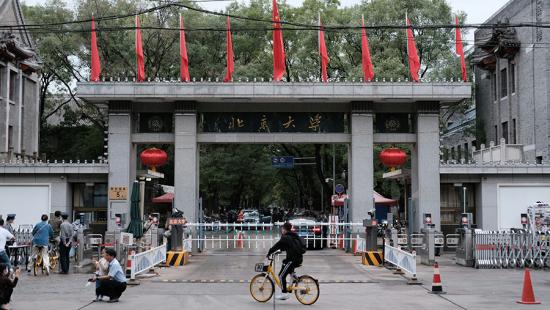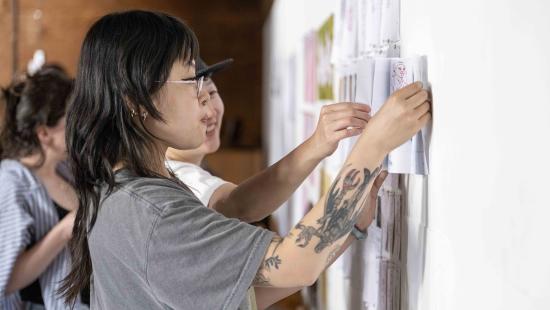All NYC Planning Schools Virtual Open House, Fall 2023

Anson Wigner / AAP
Overview
Want to Try a Career Shaping Cities? Attend the All NYC Planning Schools Virtual Open House!
New York City can become your classroom! Join us for the first-ever open house bringing together all eight planning programs in the New York City region. We'll hear from inspiring alumni about what a planning degree allowed them to do in their careers and from program directors about what makes their programs unique. Start your search here, then attend a future program-specific information session to get more details.
Are you passionate about making cities more livable, equitable, and sustainable? Do you want to be a part of creating thriving places that are healthy for people of all generations and backgrounds? Do you want to help decarbonize cities and help them adapt to a changing climate? Are you concerned about congestion, gentrification, and displacement; the lack of affordable housing; and creating fairer processes of deciding what is built, where, and for whom?
Then you should consider a career in urban planning, a unique field that brings together policy, design, economics, environment, and social processes! Planning students learn about how and why cities look and work the way they do, policies and strategies to shape and transform cities, and skills like GIS, design software, economic modeling, and facilitation. Start or build on your career in local, state, or federal government agencies, in the private sector, or with non-government agencies helping communities within the U.S. or abroad.
To participate in this event, please register via the registration section of this page.
Agenda
Thursday, November 9, 2023
4 p.m. | Welcome
- Linda Shi — Assistant Professor, Department of City and Regional Planning, Cornell AAP
4:05 p.m. | Alumni Panel: Why a Career in Planning?
Four distinguished practitioners who have dedicated their lives to shaping cities from different approaches will share their thoughts on why they went to planning grad school, how it's different from other fields, and what a career in planning has allowed them to do.
- Namon Freeman, NYU Wagner '16 — Sustainability & Housing Affordability, Bloomberg Associates
- Emily Junker, Columbia GSAPP '20 — BFJ Planning
- Jorge Santos, Rutgers '13 — Chief Real Estate Development Officer, New Jersey Economic Development Authority
- Alex Sommer, Pratt Institute '12 — Director of Brooklyn Office, New York City Planning Department
4:35 p.m. | Snapshots of NYC Planning School
The heads of eight different planning and urban design programs in the New York region share what makes their programs unique. Participants have a chance to ask questions during a Q&A.
Moderators: Nicholas Dagen Bloom and Julio Salcedo-Fernandez
Comprehensive Planning Programs
- Nicholas Dagen Bloom — Program Director, Professor, Hunter College of Urban Policy and Planning
- Sophie Oldfield — Chair, Department of City and Regional Planning, Professor, Cornell AAP
- Mi Shih — Program Director, Associate Professor, Rutgers University Bloustein School of Planning and Public Policy
- Weiping Wu — Vice Provost for Academic Programs, Professor and Director of Urban Planning Program, Columbia GSAPP
Specialized Planning Programs
- Natasha Iskander — Professor, New York University, Wagner Graduate School of Public Service
- Juan Camilo Osorio — Associate Professor, Pratt Institute, Graduate Center for Planning and the Environment
- Gabriela Rendón — Associate Professor of Urban Planning and Community Development, Parson School of Design at The New School
- Julio Salcedo-Fernandez — Director of Urban Design, Associate Professor, City College of New York, Spizter School of Architecture
5:25 p.m. | Concluding Remarks
Programs
Comparison Table
There are many planning schools to pick from, including eight in the New York City region alone. We’ve made it easier for you by compiling a cheat sheet of the key features of these NYC-area schools.
| City College of New York |
Name of the program Master of Urban Planning in Urban Design Degree conferred (additional degrees options) Master of Urban Planning Location(s) of campus / study abroad/away opportunities New York, NY (Harlem) Length of program 45 credits (1 1/2 years full-time) Timing of program (days a week on campus, morning/night) 3-4 days per week on campus, primarily daytime hours Size of the cohort 8- 12 Number of T/TT/Permanent faculty The program is within the Architecture Department, which has 25 full-time and 70 adjunct faculty members, about six of whom teach in the Urban Design program in any given semester Areas of expertise / concentration Urban Design towards social and environmental justice; urban environmental, social, and technological systems; space and alternate governance; participatory urbanism Communities we work with We have deep links and interests locally and in the Global North and Global South. We are currently collaborating with local communities and the NYC DDC and Sanitation Departments. The spring studio typically includes a study trip to a far-flung urban site to both learn from and tackle challenges in a different context. Recent collaborators include the General Directorate of Urban Anthropology and Planning Office of Buenos Aires. Required classes / studios Urban Design Lab and Seminar (3 semesters); prescribed courses in Urban Histories and Theories, Urban Ecologies and Technologies, and Socially Situated Practices; and an elective option |
| Columbia GSAPP |
Name of the program Master of Science in Urban Planning (professional degree) Degree conferred (additional degrees options) Master of Science in Urban Planning (Dual degree options within GSAPP include Architecture, Historic Preservation, Real Estate Development; Dual degree options within Columbia University include Business Administration, International Affairs, Juris Doctor, Social Work, Public Health) Location(s) of campus / study abroad/away opportunities Urban Planning Studio involves projects at locations both domestic or international, so do GSAPP-wide summer workshops. Length of program 2 years Timing of program (days a week on campus, morning/night) Full-time, in-person and Part-time, in-person for eligible students with a minimum of 2 years related experience Size of the cohort 50-60 Number of T/TT/Permanent faculty 6 full-time faculty, 40-45 part-time faculty Areas of expertise / concentration Concentrations: Built Environment, Climate Adaptation and Social Justice, Community and Economic Development, International Planning and Development, Urban Analytics Communities we work with New York City Department of City Planning, Buro Happold, Philip Habib & Associates, Economic Development Corporation, HR&A Advisors, Sam Schwartz, Department of Housing Preservation and Development, and BFJ Planning. Offices Visits: Regional Plan Association, Karp Strategies, New York City Housing Authority, New York City Emergency Management, Arup, WSP, HR&A Advisors, and New York City Department of Housing Preservation and Development. International partnerships vary by time. Required classes / studios 27 required points (History and Theory of Planning, Geographic Information Systems, Planning Methods, Economics for Planners, Planning Law, Planning Studio, Thesis I/Capstone I, Thesis II/Capstone II) |
| Cornell CRP |
Name of the program Degree conferred (additional degrees options) Master of Regional Planning (M.R.P.) Location(s) of campus / study abroad/away opportunities Ithaca, NY, with options to study for a semester in AAP campuses in New York City or Rome Length of program 2 years Timing of program (days a week on campus, morning/night) Full-time, in-person, courses during the day Size of the cohort 40-60 Number of T/TT/Permanent faculty 20 Areas of expertise / concentration Designing the City; Economic Development Planning; Land Use and Environmental Planning; International Studies in Planning Communities we work with New York City, Rust Belt cities and towns like Cleveland, Buffalo, and other Upstate New York towns, Northeast cities and towns, Chicago (IL), Los Angeles (CA), Jackson (MS), coastal US communities, Shanghai (China), Nilgiris (India), Addis Abbaba (Ethiopia), Cape Town (South Africa) Required classes / studios 3 required classes (Intro to Planning History and Practice, Urban Theory, Methods of Planning; competency in statistics and economics; 2 required qualitative and quantitative methods classes from selection of options; a workshop class from selection of options; an internship; and an exit project. |
| Hunter College |
Name of the program Department of Urban Policy and Planning, Master of Urban Planning Degree conferred (additional degrees options) Master of Urban Planning Location(s) of campus / study abroad/away opportunities New York City, Upper East Side, 68th Street/Hunter Subway Stop on the 6 Line Length of program 2 years full-time Timing of program (days a week on campus, morning/night) Full-time, in-person. All courses meet after 5:30 PM from Monday to Thursday. All courses except studio meet once per week. Opportunities to take in-person courses at other CUNY campuses. Size of the cohort 50-60 Number of T/TT/Permanent faculty 13 Areas of expertise / concentration Concentrations: Economic Development, Community Planning and Advocacy, Housing and the Built Environment, Transportation and Infrastructure, Climate Change and Urban Environmental Futures, General Practice Communities we work with Extensive studio commitments in New York City and the NY region. Recent clients include Brooklyn Department of City Planning, NYC DOT, Regional Plan Association, NYC Department of Sanitation, Towns of Mount Vernon and New Rochelle, Association of Neighborhood and Housing Development, Community Service Society, Newtown Creek Alliance, Bricks and Mortals, Westchester County Department of Planning, Bronx Community Land Trust, City of Stamford Required classes / studios 21 Credits in Core Courses (such as Intro to Planning, History and Theory, Intro to GIS, Urban Data Analysis); 12 credits Concentration; 12 credits Elective choice; 6 credit Studio; 3 credit Internship (can be substituted with elective). |
| NYU Wagner |
Name of the program Degree conferred (additional degrees options) Master of Urban Planning with specialization in either City & Community Planning or International Planning Development Location(s) of campus / study abroad/away opportunities New York City; Global Field Intensives available. Length of program 45 credits (2 years full time/up to 5 years part time) Timing of program (days a week on campus, morning/night) Full-time or part-time options (for eligible students). Core classes only available virtually. All other courses in-person. Classes meet 1x per week (2x if lab component). Classes typically meet later afternoon/early evening. Size of the cohort 40-50 Number of T/TT/Permanent faculty 11 Areas of expertise / concentration Students choose either City & Community Planning or International Development Planning. Additional Focus Areas include Cities, Communication Skills, Data Science & Data Management, Education, Environment, Climate Change & Sustainability, Health Policy & Management, Inequality, Race & Poverty, International Development & Humanitarian Action, Nonprofits & Government, Philanthropy & Fundraising, Program Evaluation, Social Justice & Democracy, and Transportation. Communities we work with New York City and tristate area, Buffalo, Albany, Chicago. Los Angeles, San Francisco, and international centers including Berlin, Seoul, Istanbul, Lagos. Research centers include collaborations with U.S. Environmental Protection Agency, the U.S. Department of Homeland Security (through university centers at NYU, USC, and Dartmouth), the National Science Foundation, the U.S. Department of Transportation Region 2 University Transportation Research Center, the NYS Department of Transportation, and the Fund for Public Health in NY. Required classes / studios 5 Core classes required (waivers available): Statistical Methods, Microeconomics, Management and Leadership, Financial Management, Urban Planning: Methods and Practice, and History and Theory of Planning. Three (15 credits) specialization-specific courses and 15 credits (approx. 5 classes) of the student’s choice required. Cross-registration options available to other NYU graduate programs, including NYU Law, NYU Stern, or NYU Tandon. Professional Experience Requirement (~ 8-week internship) must be completed unless waived by Office of Career Services. Final project is a year-long Capstone project in conjunction with a foundation, government office, or organization. |
| The New School |
Name of the program Design and Urban Ecologies in the School of Design Strategies Degree conferred (additional degrees options) Master of Science Location(s) of campus / study abroad/away opportunities New York City, NY; with optional Global Intensive Studio in cities such as Hong Kong, Macau, Shenzhen, New Delhi, Rio de Janeiro, Venice, and Medellin. Length of program 2 years, 60 credits Timing of program (days a week on campus, morning/night) Full-time, in-person, courses during the day Size of the cohort 12 Number of T/TT/Permanent faculty 6 Areas of expertise / concentration forces transforming low-income districts and neighborhoods of color Communities we work with New York City and the five boroughs; Newark (NJ); international hubs such as Hong Kong and the Pearl River Delta (PRD); Quito (Ecuador); Medellín (Columbia); Rio de Janeiro (Brazil) Required classes / studios 4 required DUE methods courses, 3 required DUE studio courses, 2 required Urban Colloquium Courses, Urban Theory Lab, Urban History Lab, Graduating Thesis |
| Pratt Institute |
Name of the program Degree conferred (additional degrees options) Master of Science Location(s) of campus / study abroad/away opportunities Brooklyn, NY Length of program 2 years, 50 credits Timing of program (days a week on campus, morning/night) Full-time and part-time; evening classes; 2-3 evenings per week on campus, in-person. Size of the cohort 16 Number of T/TT/Permanent faculty 6 Areas of expertise / concentration community development; heritage/cultural conservation; environmental systems; urban placemaking and management; spatial analysis Communities we work with Multiple neighborhoods throughout NYC; Newark, NJ; Hudson Valley; Atlanta, GA; Havana, Cuba; Tokyo, Japan; the Netherlands; Rio de Janeiro, Brazil; Puerto Rico; Mexico City, Mexico. Required classes / studios Up to 36 required credits, including skills, methods, history & theory, economics, law, statistics, research design, participatory planning techniques; one introductory and one advanced studio; thesis or demonstration of professional competence. Electives can be taken in planning or sister programs in preservation, placemaking, environmental systems and interdisciplinarity is encouraged and fostered. |
| Rutgers University |
Name of the program Master of City and Regional Planning (MCRP) Degree conferred (additional degrees options) Master of City and Regional Studies (MCRS); Ph.D. in Planning and Public Policy Location(s) of campus / study abroad/away opportunities Rutgers University's main flagship campus in New Brunswick, NJ Length of program 2 years full-time Timing of program (days a week on campus, morning/night) full-time and part-time study available; courses are offered mostly in person with some online options on M–Th from 9 a.m.–9 p.m. ET. Size of the cohort 50-60 Number of T/TT/Permanent faculty 19 Areas of expertise / concentration Community Development and Housing, Design and Development/Redevelopment, Environmental Planning, International Development, Transportation Policy and Planning, Urban Informatics. Hybrid concentrations can be created by students as well in consultation with their faculty academic advisor. Communities we work with The MCRP program at Bloustein School has strong collaborative relationships with communities, NGOs, and government agencies in the larger NY-NJ-PA metropolitan region and also internationally. Studio classes and research projects have recent collaborations with City of Newark Planning, Jersey City, Asbury Park, City of Elizabeth, Dunellen, Unity Square community organization in New Brunswick, Latino Action Network Foundation, Monarch Housing Associates, St. Joseph's Carpenter Society, New Community Corporation in Newark, Vehicles for Change in Baltimore, the community development corporation and Asociacion Puertorriquenos en Marcha (APM) in Pennsylvania, the Anchorage Museum and Bike Anchorage in Alaska, NJ Housing Mortgage Finance Agency, NJ Department of Health, NJ Sports and Exposition Authority; NJ Department of Environmental Protection, Northeast Corridor transportation planning, NJ Department of Transportation, NJ Transit, NJ Board of Public Utilities, NJ Office of Planning Advocacy. Internationally, collaboration partners include UN Dept Economic and Social Affairs (DESA), Global Environmental Facility (HQ Washington, DC), The Organization of Urban Re-s in Taiwan, School of Architecture at the University of Campania and the Region Centre for Cultural Heritage, Ecology and Economy in Italy, the Consejo de Gobierno de Galápagos, the Gobierno de Puerto Baquerizo Moreno, and the Galápagos Education and Research Alliance in Ecuador. Required classes / studios 24 credits of core courses such as History and Theory of Planning, Urban Economy and Spatial Patterns, 2 graduate Planning studios, Basic Quantitative Methods, Planning Methods, Survey of Planning Law Principles, etc.; students must also complete 12 credits / 4 graduate courses in their concentration area. |
Additional Events
Participating Insitution's Fall Information Sessions & Open Houses
If you want to learn more about any of these schools, you can attend their fall 2023 open houses. Click on the links below to find out more information and sign up to receive information about their schools.
City College of New York
Master of Urban Planning in Urban Design Info Session
- Wednesday, November 8, 12–1 p.m. ET
Columbia GSAPP
- Monday, October 16, 9 a.m.–8 p.m. ET
General Admissions Information Sessions
Cornell University, Department of City and Regional Planning
City and Regional Planning Virtual Graduate Information Sessions
- Thursday, October 12, 4:30–5:30 p.m. ET
- Thursday, November 16, 7–8 p.m. ET
- Friday, December 8, 10–11 a.m. ET
Hunter College
UPP Open House for Prospective Graduate Students
- Tuesday, October 10, 6:30–8:30 p.m. ET
NYU Wagner
- Thursday, November 16 at 6 p.m. ET
- Thursday, January 25 at 6 p.m. ET
Parsons School of Design at The New School
MS Design and Urban Ecologies Virtual Information Session
- Monday, November 13, 3–4 p.m. ET
Pratt Institute
GCPE Admissions Info Sessions
- Thursday, October 19, 3–5 p.m. ET [In-Person]
- Tuesday, November 14, 10 a.m.–12 p.m. ET [Virtual]
Rutgers University
Master of City and Regional Planning Virtual Info Session
- Tuesday, November 14 at 6 p.m. ET







